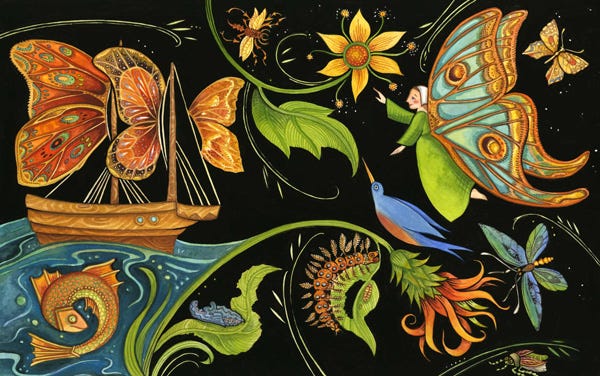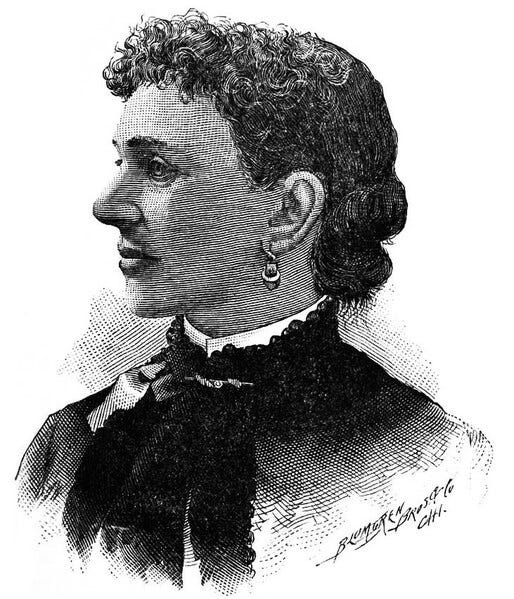
I planned on writing about “Bad Bosses,” but decided it was too petty for the seriousness of the day. The world is on fire, who cares about some assholes I had to deal with 20 years ago. I’ll get back to the petty at some point. But right now I am thinking about butterflies.
No, not literal ones. The metaphorical ones associated with Chaos theory.
In a nutshell, the Butterfly effect is that even the tiniest flap – a word, a gesture, a decision – can stir up changes far beyond what we expect. One small act doesn’t stay small; it sets off ripples that land places we may never see. Because you can’t control outcomes, it’s a control freak’s kryptonite.
I am sequestered in a Writers Conference at Colgate University, where we are exploring styles of prose. After a wine reception, I take a peek at Substack and am horrified to see marines in a city and a cabinet secretary threatening to overthrow elected state and city officials. In the face of that chaos, I look away. The retreat is a sanctuary from madness.
Hanging with writers, I hear how the randomness of life impacted them in both small and large ways.
The woman who recounts her husband on his way home from work, calling to see if she needs anything from the store. She does. But he sounded tired. She said: Nothing.
But her husband never made it home. He was killed in a car crash. If she had said detergent, would he still be alive?
The young man traveling with his girlfriend is en route to see his grandfather. But the couple gets in a huge fight, about nothing anyone remembers. He misses the exit, and 30 miles later, calls his grandfather to say they won’t make it. If they had, it would have been the last time he would have seen his grandfather. Instead, he didn’t have that last time, he had guilt.
Not all ripples feel dramatic at the time. Some come with the weight of hindsight.
Dad was in the hospital after a mild heart attack. Yet at age 93, his heart was fading and they told us he only had weeks maybe a month to live. But while in the hospital, he contracted Covid. His final days should have meant hand-holding, whispers, tears, laughter. Instead, he was in isolation from humans.
But ripples don’t have to be negative, although that is where most of our minds go – the what ifs? The could haves.
I ask another writer how she became a doctor. Thirty-five years ago, she was a physician assistant (PA) and heard the derogatory terms made about PAs by the medical staff. Patients often confused her white coat with being a doctor. The repeated voices impacted her, and she went to medical school. After her residency at Yale, she went to Honduras for almost a decade to administer to the poor.
Her journey reminds me that even in chaos, courage can reshape the map.
We think our lives will follow some scripted path and instead find there are detours and road blocks. Unexpected pregnancies, unexpected losses; expected events with unexpected reactions. Worse, we think there is nothing we can do to change a situation, and refuse to try.
In discussing my book project on ancestral relative and workplace activist Leonora Kearney Barry,1 my workshop leader asks, “If Leonora were alive what would she say to you?”
Her question is a breeze that ushers in a butterfly.
As a young widow trying to support her family, Leonora labored in a textile mill and saw first-hand the abuses, unsafe conditions, unfair wages. She could have stayed silent, but she wanted a better world for her children - and other people’s children. She is beyond inspiring.
When I should have been sleeping, I was role playing, and finally Leonora’s words in an Irish lilt come through, direct as ever:
“Diane, you have the luxury of voice. Don’t squander it. In my time, we fought to be heard over the din of factory wheels and the shouting of men’s opinions. I wanted to create a more perfect and just world.
“You’ve inherited my blood — and my unfinished work. You have the ability to turn the quiet griefs and the unseen labors of women into stories people choose to read. That is its own kind of organizing.
“Use your voice. Be that butterfly.”
It’s an urging.
Still, I feel hesitant. I do my Saturday #Resist protests, but they are in virtual anonymity.
Another peek at the news: I see a sitting senator’s person and position defiled. My stomach clenches and my heart quickens. I feel sick and anxious that I am not doing enough. Worse, I feel a sense of shame that with my position in life, I could and should be doing more.
I’ve been nervous about allowing my writing to go to the political – for fear of offending. Possibly for fear of being shunned; for losing relationships I truly value, including new friends I have made. But I also fear that those who will be offended – will not have a second thought about being offensive.
Leonora summoned courage and fought not just for labor changes, but for women to have a vote. It’s time for me to leave this self-imposed sanctuary and be like Leonora.
The hate and disregard for justice—for the Constitution itself—is palpable. I could say nothing and let something precious slip away.
Or I could cause a tiny ripple.
And then I had an idea:
What if we, en masse, decided to flap our wings—a kaleidoscope of us, fluttering, beautiful, chaotic—turning ripples into waves?
How are you being a butterfly? joining protests? encouraging friends and family members? being an advocate for marginalized groups? I’d love for you to tell us in the comments how we can find our wings.
Book I am reading
Just finishing up Ariel Lawson’s The Frozen River is a fictionalized recounting of Martha Ballard, 18th century midwife and healer. Intelligent and with a strong sense of fairness, has a tremendous compassion for the people around her.
Next up is Kazoo Ishiguro’s The Remains of the Day.
Leonora Kearney Barry was a 19th century labor activist and suffragette, who fought against workplace abuses, domestic violence, and the marginalizing of women.







Keep making your ripples.
Leonora's legacy of activism inspires!